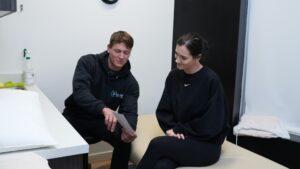
Your doctor may recommend rehabilitation therapy to help you recover from a serious injury, surgery, or stroke. Rehabilitation therapy allows you to regain strength, regain lost skills, or find new ways to do activities that you find challenging now.
Rehabilitation therapy can take many forms, however, in this article, we will discuss active, physio, and sports therapy. A rehab program may serve different purposes in helping a person recover, but all aim to restore a patient to a healthy, active lifestyle. In this article, we will outline some common types of rehab therapy and the benefits they bring to our patients.
What is Active Rehabilitation?

The purpose of active rehabilitation is to provide clients who have been in a motor vehicle accident with a therapeutic program that emphasizes exercise. Exercise-based rehabilitation is performed by kinesiologists. It is similar to kinesiology because a full assessment helps diagnose issues, and then a detailed exercise program is designed to help your body regain its functionality and stability.
Active rehabilitation is generally prescribed by doctors and funded by ICBC for conditions related to posture, muscle weakness, neck injuries, and back pain.
Active rehabilitation can treat the following conditions:
- Poor posture
- Decreased core strength
- Repetitive strains
- Whiplash injuries
- Neck and back pain
- General fitness
How Does Physiotherapy Work?
As with active rehabilitation, physio is often recommended if you have suffered an injury or illness that makes daily activities difficult.
The goal of physiotherapy is to alleviate pain and help you function, move, and live better. Patients rely on physio to:
- Relieve pain
- Improve mobility
- Prevent or help you recover from a sports injury
- Prevent disability or surgical intervention
- Teach you how to maintain your balance to prevent slips and falls
- Manage a chronic illness like arthritis
- Recovery after childbirth
- Easily adapt to an artificial limb
- Learn to use assistive devices
- Wear a brace or splint
There are many different types of health conditions that physio can help with, and it benefits people of all ages.
Should Physio Cause Pain?

When performed by a licensed therapist, physiotherapy should not hurt.
The process can, however, be challenging. The exercises will be challenging, and you will experience discomfort and soreness afterward.
Strengthening your body requires training. Exercises and stretches may be beyond your comfort zone, but the process should not be painful. Each person responds to therapy differently, so it is important to remember that your therapy can be altered if it becomes too challenging or uncomfortable.
By communicating your specific goals with your therapist, you will enhance your recovery.
Should I Continue Physiotherapy if it Hurts?
In a nutshell—no, it should never be painful.
It is common to feel hesitant or even nervous about physiotherapy. While it may be intimidating to have a stranger poke around in an area of your body that causes discomfort and pain, if it will greatly benefit your quality of life, do not let this discourage you.
If you have concerns about pain during your sessions, it is important to consult with your physician to ensure you are getting the most out of your treatment.
Will Physiotherapy Make My Pain or Discomfort Worse?
Many physiotherapy patients worry that therapy will exacerbate their existing pain. The most effective way to ensure your treatment does not become painful is to communicate clearly with your therapist.
Communication is crucial since every patient is different and has a different tolerance for pain. During treatment, you can expect the therapist to pay close attention to you and do everything they can to reduce or eliminate any discomfort.
Managing Discomfort During Physiotherapy
Your recovery depends on you. Your therapist will create a treatment plan, but it will only work if you want it to.
As an example, suppose that you are recovering from knee surgery and your therapist is teaching you exercises to increase your range of motion and strengthen the affected area. While exercising, you feel pain in the affected area. Because you don’t want to embarrass yourself or make your therapist feel bad, you don’t say anything.
This could cause further joint injury or swelling and set your progress back. During rehab, the only way to prevent situations like this from occurring is to communicate frequently with your therapist—it is also the best way to speed up recovery.
Our specialists at Synergy Rehab Surrey Nordel Physiotherapy build relationships based on trust and communication. Please let us know how you are doing—it means the world to us and your recovery
Experiencing Pain After Physiotherapy? Here’s What You Can Do
Though you may feel worse after therapy, you should not feel any pain.
Is it normal to feel sore after? Absolutely.
To mobilize, stretch, and strengthen the affected area, you will have to perform exercises and movements that may cause soreness afterward.
However, if the pain goes beyond soreness or discomfort, you should schedule an appointment with your therapist to determine the cause. You will be able to choose between various pain control options and your therapy will be adjusted accordingly.
How Is Sports Rehab Different from Physiotherapy

Sports physiotherapy deals with issues related to athletic injuries. These injuries differ from everyday injuries because an athlete’s body is put under a lot of stress, which demands high levels of performance and can cause a great deal of stress to muscles, joints, and bones.
Here at Synergy Rehab, our specially trained sports physiotherapists offer methods to treat athletic injuries, restore lost function and mobility, and prevent future injuries. Elite athletes have relied on us for years to help them return to their sport safely and quickly.
Can Youth Athletes Benefit from Sports Therapy?
The members of our talented team also have extensive experience in treating sports injuries in youth and can provide a wide range of rehabilitation therapies customized for children and teenagers in addition to education about the skills and techniques needed to maximize athletic performance and prevent future injuries.
At Synergy Rehab Surrey Nordel Physiotherapy we have one mission—to bring caring, quality rehabilitative care to our community. With 9 locations conveniently spread throughout Surrey, New Westminster, and Richmond, BC our professional team is continuously driven to provide individualized and excellent care to you and your family. If you are interested in learning more about our diverse range of therapy services, contact us today to get started.







